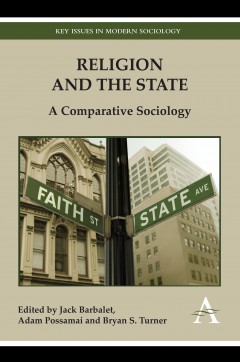Religion and the State
A Comparative Sociology
Edited by Jack Barbalet
Adam Possamai
Bryan S. Turner
- About This Book
- Reviews
- Author Information
- Series
- Table of Contents
- Links
- Podcasts
About This Book
This volume addresses a central problem of contemporary states, namely how to manage the eruption of public religions. While the liberal framework formerly regarded religion as simply a matter of private practice and conscience, in modern states religion has often come to challenge the so-called Westphalian model of church-state relations, and has brought into question many liberal notions of secularism and tolerance. There is much discussion about post-secular society in which religion has to be taken seriously in public affairs. This collection of case studies – looking at Turkey, Singapore, India, China, Britain, Europe and the United States – explores a number of examples in which the state exercises some degree of management of religion, thereby bringing into question the traditional separation of religion and state. This study also attempts to refine the notion of secularization by examining this process in terms of political arrangements (church-state relations) and the role of religion in everyday life. Ultimately, this study reveals that there is no uniform or standard pattern of secularization in modern societies.
Reviews
‘Insightful and wide-ranging […] The present volume is particularly noteworthy for both breadth and depth. It does not only provide data from Europe, the US, the formerly Communist parts of Europe, China, India, Singapore, Israel, Turkey, Australia, and so on. It uses these data to think more deeply about how religions and states interact in the late modern world. […] In short, this volume is rich and worth attention.’ —James V. Spickard, ‘Journal of Contemporary Religion’
‘Insightful and wide-ranging […] The present volume is particularly noteworthy for both breadth and depth. It does not only provide data from Europe, the US, the formerly Communist parts of Europe, China, India, Singapore, Israel, Turkey, Australia, and so on. It uses these data to think more deeply about how religions and states interact in the late modern world. […] In short, this volume is rich and worth attention.’ —James V. Spickard, ‘Journal of Contemporary Religion’
‘Edited by three sociologists and comprised of essays from a distinguished group of social scientists, ‘Religion and the State’ considers the uniquely modern frictions between politics, economics, and traditional faiths. Far from a simplistic exploration of secularisation […] The tensions of religious liberty and religious conviction are familiar, yet the authors of this volume consistently urge us to stop seeing the secular and the religious as distinct realms. […] A giant step toward greater sophistication is found through evidence provided here.’ —Gerardo Marti, ‘LSE Review of Books’ blog
‘This volume offers a mosaic of case studies that challenge classical visions of religion and call for new methodology and concepts that will allow a better grasp of the role of religion(s) in contemporary societies and its interactions with the state. Though most of the authors are sociologists, the problems discussed in this volume address a wider audience, including scholars, specialists and graduates who study religion from the perspectives of law, politics, history and culture.’ —Daniela Kalkandjieva, ‘Politics, Religion & Ideology’
‘[A]n extraordinary voyage into Anglo-European social theory and research.’ —Arthur W. Frank, ‘Canadian Journal of Sociology’
‘Religion has emerged as a key variable in understanding modern societies, and all modern nations, no matter their formal definitions of church-state relations, must engage in the management of religions and religious groups in order to maintain peace between rival religious factions as well as societal harmony. This volume by eminent scholars in the field offers great insight into how public religions are functioning in a variety of modern states, the perils and benefits garnered as governmental authorities attempt to manage this crucial area of public life, and the need to redefine the meaning of secularization in the modern world.’ —Dr James T. Richardson, University of Nevada, Reno
‘There is something here for everyone who wants to be au courant with the ways in which religion and the capitalist economy co-create each other, with citizens and believers both increasingly conceived as consumers. A valuable contribution to the contemporary debate on secularism and secularization.’ —John Torpey, City University of New York Graduate Center
Author Information
Jack Barbalet is Professor of Sociology and Head of the Department of Sociology at Hong Kong Baptist University.
Adam Possamai is Associate Professor in Sociology at the University of Western Sydney and President of the Research Committee on Religion at the International Sociological Association.
Bryan S. Turner is the Presidential Professor of Sociology at the Graduate Center, City University of New York, and Director of the Centre for the Study of Contemporary Muslim Societies, University of Western Sydney.
Series
Key Issues in Modern Sociology
Table of Contents
Introduction: States, Consumption and Managing Religion; PART I: FROM DEPRIVITIZATION TO SECURITIZATION; 1. Religion in Liberal and Authoritarian States; 2. Religion in Prisons and in Partnership with the State; 3. The Secularization Thesis and the Secular State: Reflections with Special Attention to Debates in Australia; 4. Secularism, Religion and the Status Quo; 5. Managing China’s Muslim Minorities: Migration, Labor and the Rise of Ethnoreligious Consciousness among Uyghurs in Urban Xinjiang; 6. The Tension Between State and Religion in American Foreign Policy; 7. Church, State and Society in Post-communist Europe; PART II: FROM PIETISM TO CONSUMERISM; 8. Chinese Religion, Market Society and the State; 9. Hindu Normalization, Nationalism and Consumer Mobilization; 10. Clash of Secularity and Religiosity: The Staging of Secularism and Islam through the Icons of Atatürk and the Veil in Turkey; 11. Gramsci, Jediism, the Standardization of Popular Religion and the State; PART III: CONCLUDING COMMENTS; 12. Concerning the Current Recompositions of Religion and of Politics; 13. Public Religions and the State: A Comparative Perspective
Links
Stay Updated
Information
Latest Tweets



